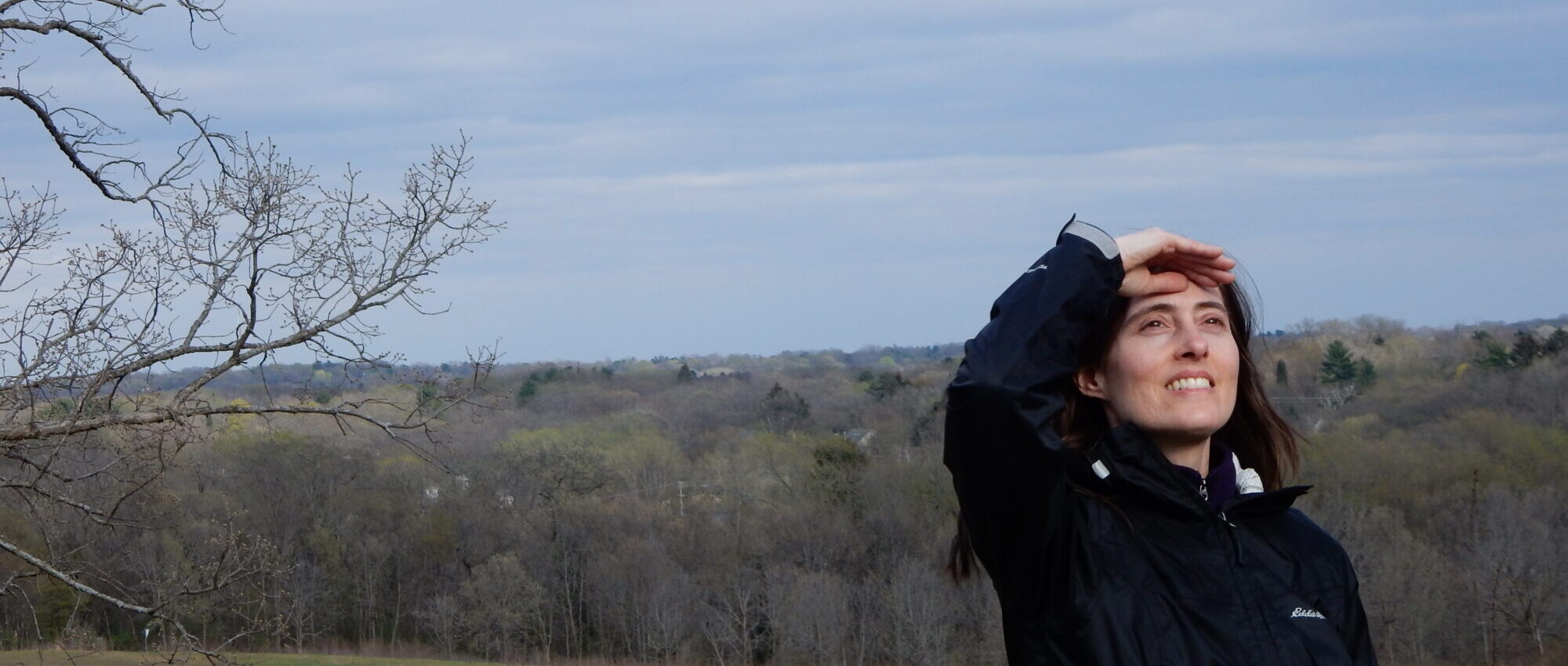Have you ever congratulated yourself for doing something seemingly clever—oh, say, trying to get ahead of a storm, timing it just right on the road—only to realize later that you were just darn lucky?
A couple weeks ago, driving up through Wisconsin’s North Woods, keeping an eye on weather radar, I dodged a storm, nudging further west, then north, then west and north and west again, skirting a large black low-bellied cloud mass I kept thinking I could drive around–until the mass became miles wide and there was no more west to go.
I’d successfully maneuvered my way around the storm with only fifteen miles between me and my destination. But now I had no choice. I had to navigate north, out of the dwindling cloud-fringed sunlight, and toward the inky scribble of storm ahead.
I took a deep breath and punched through into a light rain that soon turned into a hard downpour. I kept thinking with the next deep breath that I just had a few more minutes to go. A few more minutes turned into a half hour of on-and-off waterworks that kept filling the ditches to the left and right of me. All the while I drove, watching the water levels rise, thinking how beautiful the storm. How strange and strong and bold, the way water can whip and wend and thrill and pour down and thunder forth.
I later learned that around the same time I reached my family’s old farmland safely, the rain deluged into a flash flood that washed out miles of roads in my wake.
I later learned that around the same time I reached my family’s old farmland safely, the rain deluged into a flash flood that washed out miles of roads in my wake.
That’s a video from WBAY news. Shortly after I got off the road and shook the rain off my hoodie, a small highway I had been on, featured in the video, broke in two just as a sheriff’s deputy drove over a swollen culvert. His SUV plunged into the rushing water along with giant chunks of blacktop. Somehow the deputy and his two K9s got out before the vehicle filled with water, and they found safety on higher ground.
As I watched the story on the news later that night, and saw footage of that drowned car, I swallowed hard. They were fine. Just a few miles from where I was driving, just a few minutes from when I was driving. They were almost toast.
We may think we’re in control. May think we’ve got it figured out. We may even be prepared. Have all the tools. In a storm that means equipment. Radar. Maps. GPS. Even knowledge of the lay of the land, the nature of nature.
In writing that means craft tools like metaphor and plot, scene building and sentence construction, character development and theme. Plus an understanding of the lay of that land that is your own work—your style and voice and approach. Where you’ve been, where you want to go. Along with the nature of the piece you’re writing. You can intuit it, know its contours, what its capable of. Or at least think you know.
Knowledge is power. But nature can overpower our knowledge. And surprises can come at us—from underneath.
When I was skirting that storm, watching the radar, staying on track, thinking I had it all under control—did I? Yes and no. I kept adjusting my timing based on radar. Adjusting my path. Feeling solid and confident about my choices—for the most part. I had some skills, some knowledge. And I used all the tools I had to avoid the storm successfully. Until I couldn’t.
The conditions around me were changing too fast. Maybe I’d timed it well at first, staying on top of things, missing the worst of it by less than an hour. But luck had a lot to do with it.
Another fifteen minutes here, or fifteen miles there, and an overwhelmed ditch may have swept me off the road and into a makeshift river.
As a writer, when I get over-confident, and think, oh yeah, I’ve figured out just where I am, what I’m doing, what it means—sometimes things do fit together and I’m right. But often, the nature of what I’m working with is fluid. I may not know all the piece is capable of. The work itself may be greater than my understanding of it. And soon something may shift from beneath—and I can lose all momentum.
Fortunately, if something gives way in a piece of writing, it’s not life or death. And doesn’t necessarily mean the whole piece collapses. It may mean the opposite. That breaking point may be just what I need to find the next new discovery in order to make the piece work. I can even honor that wild capability—and give it room to open up something new in my writing.
Ironically, the best way to stay open to that level of drastic surprise and new discovery is to be prepared.
Whether you’re driving or writing, I encourage you to plan ahead, have a map and reliable GPS system handy, keep your eye on the road—and buckle up. Because you may be surprised by where you’re headed.


